December 17, 2020|Maria Firkaly
10 Short Fiction Titles to Finish Up 2020
I personally follow about a dozen “book” groups on Facebook. It is a fun way for me to find new things to read and have discussions with fellow book lovers. There are many in these groups that have read hundreds of books this year. 2020 has been quite the year and everyone has been dealing with the stress and uncertainties differently. While some of us have immersed ourselves into stories as a means of escape, others have found concentrating on a book difficult and frustrating.
I put together this list of 10 short fiction titles for those who want to squeeze in a few more books to meet a reading goal and for those who love reading, but just need something shorter right now. I hope you find something you like on the list. All the titles are available for holds in the Clevnet Catalog. Many are available in both print and digital options.
If you need any help placing a hold or have other questions, please give our library staff a call. We are available Monday through Friday from 10 AM to 7 PM at 440-293-6792.
Here’s to the arrival of 2021 and the stories yet to come.
1. An Elderly Lady is Up to No Good by Helene Tursten
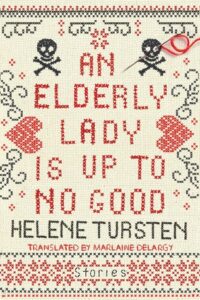
171 p. (Fiction – Short Stories – Mystery)
Maud is an irascible 88-year-old Swedish woman with no family, no friends, and…no qualms about a little murder. This funny, irreverent story collection by Helene Tursten, author of the Irene Huss investigations, features two-never-before translated stories that will keep you laughing all the way to the retirement home.
Ever since her darling father’s untimely death when she was only eighteen, Maud has lived in the family’s spacious apartment in downtown Gothenburg rent-free, thanks to a minor clause in a hastily negotiated contract. That was how Maud learned that good things can come from tragedy. Now in her late eighties, Maud contents herself with traveling the world and surfing the net from the comfort of her father’s ancient armchair. It’s a solitary existence, but she likes it that way.
Over the course of her adventures—or misadventures—this little bold lady will handle a crisis with a local celebrity who has her eyes on Maud’s apartment, foil the engagement of her long-ago lover, and dispose of some pesky neighbors. But when the local authorities are called to investigate a murder in her apartment complex, will Maud be able to avoid suspicion, or will Detective Inspector Irene Huss see through her charade?
2. And Then There Were None by Agatha Christie
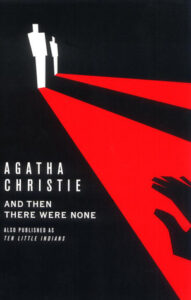
275 p. (Mystery – Classics)
First, there were ten—a curious assortment of strangers summoned as weekend guests to a little private island off the coast of Devon. Their host, an eccentric millionaire unknown to all of them, is nowhere to be found. All that the guests have in common is a wicked past they’re unwilling to reveal—and a secret that will seal their fate. For each has been marked for murder. A famous nursery rhyme is framed and hung in every room of the mansion:
“Ten little boys went out to dine; One choked his little self and then there were nine. Nine little boys sat up very late; One overslept himself and then there were eight. Eight little boys traveling in Devon; One said he’d stay there then there were seven. Seven little boys chopping up sticks; One chopped himself in half and then there were six. Six little boys playing with a hive; A bumblebee stung one and then there were five. Five little boys going in for law; One got in Chancery and then there were four. Four little boys going out to sea; A red herring swallowed one and then there were three. Three little boys walking in the zoo; A big bear hugged one and then there were two. Two little boys sitting in the sun; One got frizzled up and then there was one. One little boy left all alone; He went out and hanged himself and then there were none.”
When they realize that murders are occurring as described in the rhyme, terror mounts. One by one they fall prey. Before the weekend is out, there will be none. Who has choreographed this dastardly scheme? And who will be left to tell the tale? Only the dead are above suspicion.
3. The Bell Jar by Sylvia Plath

234 p. (Fiction – Classics)
The Bell Jar chronicles the crack-up of Esther Greenwood: brilliant, beautiful, enormously talented, and successful, but slowly going under—maybe for the last time. Sylvia Plath masterfully draws the reader into Esther’s breakdown with such intensity that Esther’s insanity becomes completely real and even rational, as probable and accessible an experience as going to the movies. Such deep penetration into the dark and harrowing corners of the psyche is an extraordinary accomplishment and has made The Bell Jar a haunting American classic.
4. Why Did I Ever? by Mary Robison
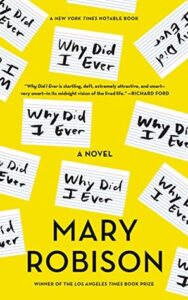
200 p. (Fiction – Short Stories)
“Tense, moving, and hilarious…[a] dark jewel of a novel.” —Francine Prose, O: The Oprah Magazine.
After a ten-year silence, Mary Robison has emerged with a novel so beguiling and funny that it has brought critics and her live-reading audiences to their feet. Why Did I Ever takes us along on the darkest of private journeys. The story, told by a woman named Money Breton, is submitted like a furious and persuasive diary—a tale as fierce and taut as its fictional teller.
5. The Friend by Sigrid Nunez
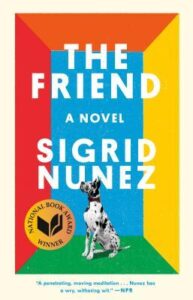
212 p. (Fiction/Animals/Literary Fiction)
(I ordered this from another library for a current display in Andover. This book sounds lovely and on my to be read list.)
A moving story of love, friendship, grief, healing, and the magical bond between a woman and her dog.
When a woman unexpectedly loses her lifelong best friend and mentor, she finds herself burdened with the unwanted dog he has left behind. Her own battle against grief is intensified by the mute suffering of the dog, a huge Great Dane traumatized by the inexplicable disappearance of its master, and by the threat of eviction: dogs are prohibited in her apartment building.
While others worry that grief has made her a victim of magical thinking, the woman refuses to be separated from the dog except for brief periods of time. Isolated from the rest of the world, increasingly obsessed with the dog’s care, determined to read its mind and fathom its heart, she comes dangerously close to unraveling. But while troubles abound, rich and surprising rewards lie in store for both of them.
Elegiac and searching, The Friend is both a meditation on loss and a celebration of human-canine devotion.
6. Goodbye Vitamin by Rachel Khong

208 p. (Contemporary Fiction)
Goodbye, Vitamin is the wry, beautifully observed story of a woman at a crossroads, as Ruth and her friends attempt to shore up her father’s career; she and her mother obsess over the ambiguous health benefits – in the absence of a cure – of dried jellyfish supplements and vitamin pills; and they all try to forge a new relationship with the brilliant, childlike, irascible man her father has become.
7. Dept. of Speculation by Jenny Offhill
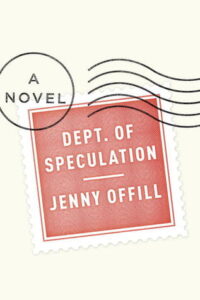
179 p. (Contemporary Fiction)
Dept. of Speculation is a portrait of a marriage. It is also a beguiling rumination on the mysteries of intimacy, trust, faith, knowledge, and the condition of universal shipwreck that unites us all.
Jenny Offill’s heroine, referred to in these pages as simply “the wife,” once exchanged love letters with her husband postmarked Dept. of Speculation, their code name for all the uncertainty that inheres in life and in the strangely fluid confines of a long relationship. As they confront an array of common catastrophes – a colicky baby, a faltering marriage, stalled ambitions – the wife analyzes her predicament, invoking everything from Keats and Kafka to the thought experiments of the Stoics to the lessons of doomed Russian cosmonauts. She muses on the consuming, capacious experience of maternal love and the near-total destruction of the self that ensues from it as she confronts the friction between domestic life and the seductions and demands of art.
With cool precision, in language that shimmers with rage and wit and fierce longing, Jenny Offill has crafted an exquisitely suspenseful love story that has the velocity of a train hurtling through the night at top speed. Exceptionally lean and compact, Dept. of Speculation is a novel to be devoured in a single sitting, though its bracing emotional insights and piercing meditations on despair and love will linger long after the last page.
8. Nothing to See Here by Kevin Wilson
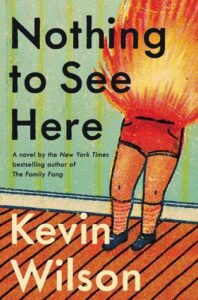
254 p. (General Fiction – Magical Realism)
(Okay, this is a bit of a strange story, but I read it this summer and loved it. This is one of my favorite reads of the year.)
Lillian and Madison were unlikely roommates and yet inseparable friends at their elite boarding school. But then Lillian had to leave the school unexpectedly in the wake of a scandal and they’ve barely spoken since. Until now, when Lillian gets a letter from Madison pleading for her help.
Madison’s twin step-kids are moving in with her family and she wants Lillian to be their caretaker. However, there’s a catch: the twins spontaneously combust when they get agitated, flames igniting from their skin in a startling but beautiful way. Lillian is convinced Madison is pulling her leg, but it’s the truth.
Thinking of her dead-end life at home, the life that has consistently disappointed her, Lillian figures she has nothing to lose. Over the course of one humid, demanding summer, Lillian and the twins learn to trust each other—and stay cool—while also staying out of the way of Madison’s buttoned-up politician husband. Surprised by her own ingenuity yet unused to the intense feelings of protectiveness she feels for them, Lillian ultimately begins to accept that she needs these strange children as much as they need her—urgently and fiercely. Couldn’t this be the start of the amazing life she’d always hoped for?
With white-hot wit and a big, tender heart, Kevin Wilson has written his best book yet—a most unusual story of parental love.
9. Margaret the First by Danielle Dutton

160 p. (Historical Fiction)
Margaret the First dramatizes the life of Margaret Cavendish, the shy, gifted, and wildly unconventional 17th-century Duchess. The eccentric Margaret wrote and published volumes of poems, philosophy, feminist plays, and utopian science fiction at a time when “being a writer” was not an option open to women. As one of the Queen’s attendants and the daughter of prominent Royalists, she was exiled to France when King Charles I was overthrown. As the English Civil War raged on, Margaret met and married William Cavendish, who encouraged her writing and her desire for a career. After the War, her work earned her both fame and infamy in England: at the dawn of daily newspapers, she was “Mad Madge,” an original tabloid celebrity. Yet Margaret was also the first woman to be invited to the Royal Society of London—a mainstay of the Scientific Revolution—and the last for another two hundred years.
Margaret the First is very much a contemporary novel set in the past, rather than “historical fiction.” Written with lucid precision and sharp cuts through narrative time, it is a gorgeous and wholly new narrative approach to imagining the life of a historical woman.
10. Every Heart A Doorway by Seanan McGuire #1 Wayward Children Series
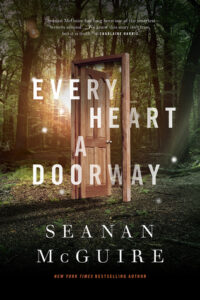
(I found this as a “quick” read recently and ended up enjoying the author so much, I read several more in the series.)
173 p. (Fantasy)
Eleanor West’s Home for Wayward Children
No Solicitations
No Visitors
No Quests
Children have always disappeared under the right conditions; slipping through the shadows under a bed or at the back of a wardrobe, tumbling down rabbit holes and into old wells, and emerging somewhere… else.
But magical lands have little need for used-up miracle children.
Nancy tumbled once, but now she’s back. The things she’s experienced… they change a person. The children under Miss West’s care understand all too well. And each of them is seeking a way back to their own fantasy world.
But Nancy’s arrival marks a change at the Home. There’s a darkness just around each corner, and when tragedy strikes, it’s up to Nancy and her new-found schoolmates to get to the heart of the matter.
No matter the cost.
